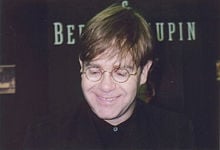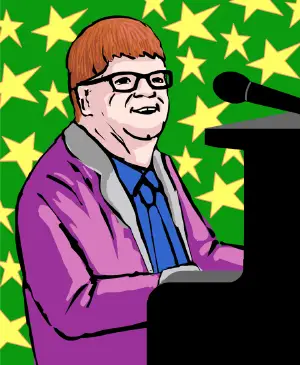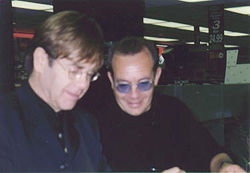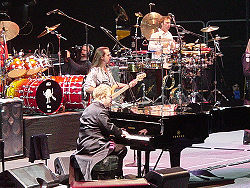Elton John
| Elton John | |
|---|---|
 | |
| Background information | |
| Birth name | Reginald Kenneth Dwight |
| Born | March 25 1947 (age 78) |
| Origin | Pinner, Middlesex, London, England |
| Genre(s) | Rock Pop Piano rock Glam rock |
| Occupation(s) | Musician, singer-songwriter, producer |
| Instrument(s) | Vocals, piano, keyboards |
| Years active | 1964‚ÄĒpresent |
| Label(s) | Uni, MCA, Geffen, Rocket/Island, Universal, Interscope, Mercury, UMG |
| Associated acts | Billy Joel |
| Website | EltonJohn.com |
Sir Elton John, born Reginald Kenneth Dwight on March 25, 1947, is an English singer, composer, and pianist. John has been one of the dominant forces in rock and popular music, especially during the 1970s, when he produced hits like "Your Song," "Rocket Man," "Bennie and the Jets," and "Crocodile Rock."
John has sold more than 250 million albums and over 100 million singles, making him one of the most successful artists of all time. He has nine number-one hits, and seven consecutive number-one U.S. albums, as well as more than 50 singles that reached the Top 40 on the Billboard pop chart. His work on the Disney animated feature The Lion King garnered an Academy Award for the song "Can You Feel the Love Tonight."
John is also noted for crafting melodies for the lyrics of songwriting partner Bernie Taupin, his classical and gospel-influenced piano. An admitted bi-sexual and later homosexual, he garnered additional fame for his flamboyant fashions and on-stage showmanship. He has won five Grammy awards and one Academy Award. In 2004, Rolling Stone ranked him number 49 on their list of the 100 greatest artists of all time. He was inducted into the Rock and Roll Hall of Fame in 1994.
Biography
Childhood
Elton John was born in Pinner, Middlesex, in a council house of his maternal grandparents, with whom his newlywed parents, Sheila Eileen Harris and Stanley Dwight, were then living. Both of his parents were musically inclined, his father having been a trumpet player with a semi-professional big band that played military dances. The Dwights were avid record buyers, exposing the boy to all the popular singers and musicians of the day. John remembers being immediately "hooked" on rock and roll when his mother brought home records by Elvis Presley and Bill Haley & His Comets in 1956.
John started playing the piano at the age of three and was soon before being pressed into service as a performer at parties and family gatherings. He began taking piano lessons at seven. He also showed great musical aptitude at school and won a junior scholarship to the Royal Academy of Music when he was 11. For the next five years, John took the subway into central London to attend Saturday classes at the academy, in addition to his regular school duties at Pinner County Grammar School.
Early career
In 1964, Dwight and his friends formed a band called Bluesology. By day, he ran errands for a music publishing company; he divided his nights between solo gigs at a London hotel bar and working with Bluesology. By the mid-60s, Bluesology was backing, touring American soul-and-R&B musicians like The Isley Brothers, Major Lance, Doris Troy, and Patti LaBelle and The Bluebelles. In 1966, the band became Long John Baldry's supporting band and began touring cabarets in England.
Around this time Dwight answered an advertisement in the New Musical Express placed by Ray Williams, then the A&R manager for Liberty Records. At their first meeting, Williams gave Dwight a stack of lyrics written by Bernie Taupin, who had answered the same ad. Dwight wrote music for the lyrics and then mailed them to Taupin, thus beginning their long partnership. In 1967, their song "Scarecrow" was recorded. When the two first met, six months later, Dwight was going by the name "Elton John," in homage to Bluesology saxophonist Elton Dean and Long John Baldry.
The team of John and Taupin joined Dick James's DJM Records as staff songwriters in 1968, and over the next two years wrote material for various artists. On the advice of music publisher Steve Brown, John and Taupin started writing more complex songs for John to record for DJM. The first was the single, "I've Been Loving You" (1968), produced by Caleb Quaye, former Bluesology guitarist. In 1969, with Quaye, drummer Roger Pope, and bassist Tony Murray, John recorded another single, "Lady Samantha," and an album, Empty Sky. Despite good reviews, none of these records sold well.
1970s
John and Taupin now enlisted Gus Dudgeon to produce a follow-up with Paul Buckmaster as arranger. Elton John was released in the spring of 1970 on DJM Records/Pye Records in the UK and Uni Records in the U.S. It established John's formula for subsequent albums, featuring gospel-influenced rock songs and poignant ballads. The first single from the album, "Border Song," peaked at number 92. However, after the second single "Your Song" made the U.S. Top 10, the album quickly followed suit. John's first American concert took place at The Troubadour in Los Angeles in August, backed by ex-Spencer Davis Group drummer Nigel Olsson and bassist Dee Murray. Kicking over his piano bench Jerry Lee Lewis-style and performing handstands on the keyboards, John left the critics raving and drew praise from fellow artists such as Quincy Jones and Bob Dylan.
Elton John was followed quickly with the concept album Tumbleweed Connection in October 1970, which also reached the Top 10 on the Billboard album chart. The live album, 11-17-70, showcased John's talent as a rock pianist. It featured extended versions of John/Taupin's early compositions and spotlighted John's gospel and boogie-woogie piano influences.
John and Taupin then wrote the soundtrack to the obscure film, Friends, and the album, Madman Across the Water, the latter reaching the Top 10 and producing the hit "Levon," while the soundtrack album yielded the hit "Friends." In 1972, the band released Honky Chateau, which became John's first American number-one album, spending five weeks at the top of the charts and spawning the hit singles, "Rocket Man (I Think It's Going To Be A Long, Long Time)" and "Honky Cat."
The 1973 album Don't Shoot Me I'm Only the Piano Player produced the hits "Crocodile Rock" and "Daniel;" the former became John's first U.S. number-one hit. Goodbye Yellow Brick Road, a double album followed later in 1973. It gained instant critical acclaim, topping the charts on both sides of the Atlantic. It also temporarily established John as a glam-rock star.
John then formed his own MCA-distributed label, Rocket Records, and signed various acts to it‚ÄĒnotably Neil Sedaka and Kiki Dee. Instead of releasing his own records on Rocket, he opted for an $8-million-deal offered by MCA. In 1974, a collaboration with John Lennon resulted in John covering The Beatles "Lucy in the Sky with Diamonds."
Caribou was released in 1974, and although it reached number one, it was widely considered a lesser quality album. At the end of the year, the compilation album, Elton John's Greatest Hits, was released and reached number one.
John made his movie debut as a character called the "Pinball Wizard" in the film version of The Who's rock opera Tommy. In the 1975 autobiographical album, Captain Fantastic and the Brown Dirt Cowboy, John revealed his previously ambiguous personality. "Someone Saved My Life Tonight" was the hit single from this album and captured an early turning point in John's life. The rock-oriented Rock of the Westies, like Captain Fantastic, entered the U.S. album chart at number one, a previously unattained feat.
Commercially, John owed much of his success during the mid-70s to his concert performances. He filled arenas and stadiums worldwide, and was arguably the hottest act in the rock world. John was an unlikely rock idol, as he was 5 feet, seven inches, chubby, and gradually losing his hair. He compensated for his unimpressive physical attributes with impassioned performances and over-the-top fashion sense. Especially known for his glasses, his flamboyant stage wardrobe now included ostrich feathers, $5,000 spectacles that spelled his name in lights, and dressing up like the Statue of Liberty, Donald Duck, or Wolfgang Amadeus Mozart.
In 1976, John released the live album Here and There in May, and the downbeat Blue Moves in October, which contained the memorable but gloomy hit "Sorry Seems to Be the Hardest Word." His biggest success in 1976 was the "Don't Go Breaking My Heart," a peppy duet with Kiki Dee that topped both the American and British charts. In an interview with Rolling Stone John revealed what many fans already suspected, namely that he was bisexual.
After facing a lackluster year in 1976-77, John announced in November 1977 that he was retiring from performing, and Taupin began collaborating with other songwriters. John secluded himself in any of his three mansions. He issued A Single Man in 1978, employing a new lyricist, Gary Osborne; the album featured no Top-20 singles.
In 1979, accompanied by Ray Cooper, John became the first Western pop star to tour the Soviet Union. He then mounted a comeback tour of the U.S. in small halls. He returned to the singles chart with "Mama Can't Buy You Love," which reached number nine in 1979.
1980s
In 1979, John and Taupin reunited. 21 at 33, released the following year, was a significant career boost, aided by his biggest hit in four years, "Little Jeannie" (number three, U.S.). His 1981 follow-up, The Fox, was recorded in part during the same sessions. On September 13, 1980, John performed a free concert to an estimated 400,000 fans on The Great Lawn in Central Park in New York City. John mourned the loss of his friend John Lennon in his 1982 hit "Empty Garden (Hey Hey Johnny)," from his Jump Up! album.
John returned to the charts with the 1983 hit album Too Low For Zero, which included "I'm Still Standing" and "I Guess That's Why They Call It The Blues," the latter of which featured Stevie Wonder on harmonica and reached number four in the U.S. While he would never again match his 1970s success, John placed hits in the U.S. Top 10 throughout the 80s, including "Little Jeannie" (number three, 1980), "Sad Songs (Say So Much)" (number five, 1984), "Nikita" (number seven, 1986), an orchestral version of "Candle in the Wind" (number six, 1987), and "I Don't Wanna Go On With You Like That" (number two, 1988). His highest-charting single was a collaboration with Dionne Warwick, Gladys Knight, and Stevie Wonder, on "That's What Friends Are For" (number one, 1985). His albums continued to sell, but of the six released in the latter half of the 1980s, only Reg Strikes Back (number 16, 1988) placed in the Top 20 in the United States.
John married German recording engineer Renate Blauel on Valentine's Day, 1984, in Sydney, but they divorced four years later. John later renounced his bisexuality and came out as being gay instead.
1990s
In 1990, John checked into a Chicago hospital to combat his drug abuse, alcoholism, and bulimia. In recovery, he lost weight and underwent hair replacement, and subsequently took up residence in Atlanta, Georgia. In the same year, John would finally achieve his first UK number-one hit on his own, with "Sacrifice" from the previous year's album, Sleeping with the Past; the song would remain at the top spot for six weeks.
In 1991, "Basque" won the Grammy Award for Best Instrumental Composition. In 1992, he released the album The One, reaching number eight in the U.S., his highest-charting release since 1976's Blue Moves. John and Taupin signed a music publishing deal with Warner/Chappell Music for an estimated $39 million over 12 years, giving them the largest cash advance in music-publishing history.
Along with Tim Rice, John co-wrote the songs for the 1994 Disney animated film, The Lion King. Three of the five songs nominated for the Academy Award for Best Song that year were John/Rice songs from movie's soundtrack, with "Can You Feel the Love Tonight" winning the Oscar. John's versions, "Can You Feel the Love" and "Circle of Life," became major hits, while other songs such as "Hakuna Matata" achieved popularity with fans of all ages. "Can You Feel the Love Tonight" would also win John the Grammy Award for Best Male Pop Vocal Performance. The soundtrack album of The Lion King remained at the top of Billboard's charts for nine weeks. By November 1999, the the album had sold 15 million copies and was certified as a RIAA diamond record.
In 1995, John released Made in England reaching number three, and featuring the hit single "Believe." A compilation called Love Songs was released the following year.
In 1997, John lost two close friends, designer Gianni Versace, who was murdered, and Diana, Princess of Wales, who died in a Paris car crash. In early September, Taupin altered the lyrics of "Candle in the Wind" for a special version mourning the death of Diana. A recorded version, "Candle in the Wind 1997," became the fastest- and biggest-selling single of all time, eventually going on to sell 5 million copies in the United Kingdom, 11 million in the U.S., and approximately 33 million worldwide, with the proceeds going to the Diana, Princess of Wales Memorial Fund. It would later win John the Grammy Award for Best Male Pop Vocal Performance.
2000‚Äďpresent
In the 2000s, John began frequently collaborating with other artists. In 2000, he and Tim Rice teamed again to create songs for DreamWorks' animated film The Road To El Dorado. In 2001, he declared that Songs from the West Coast would be his final studio album, and that he would now concentrate on only live performances. In 2001, John also duetted with Eminem on the rapper's "Stan" at the Grammy Awards which appears on Eminem's compilation album Curtain Call: The Hits as its bonus track. His biggest hit in 2002 was "Are You Ready For Love," which reached number one in the UK and on Billboard's Hot Dance Music/Club Play chart.
In October 2003, John announced that he had signed an exclusive agreement to perform 75 shows over three years at Caesars Palace on the Las Vegas Strip. The show, entitled The Red Piano, was a multimedia concert featuring massive props and video montages created by David LaChapelle. The first of these shows took place on February 13, 2004. A two-year global tour was sandwiched between commitments in Las Vegas, some of the venues of which were new to John. The same year, John released a new album, Peachtree Road.
The Elton John's Christmas Party compilation album was initially released exclusively to Hear Music outlets at every Starbucks coffee shop on November 10, 2005. On September 19, 2006, John and Bernie Taupin released a sequel to Captain Fantastic and the Brown Dirt Cowboy. The Captain & The Kid featured ten new songs, including the first single "The Bridge." John released a greatest-hits compilation CD, entitled Rocket Man‚ÄĒNumber Ones on March 27, 2007.
Legacy
While Elton John's legacy remains to be written, he has already left one of the music industry's great catalogs of work, spanning several genres from dance songs to poignant ballads and memorable movie soundtracks. Besides his singing and songwriting career, he is also noted for having pioneered the pop style known as "piano rock." Among his awards and recognitions are the following:
Grammy Awards
- 1987‚ÄĒBest Pop Performance by a Duo or Group with Vocal for "That's What Friends Are For," performed by Dionne Warwick & Friends (award shared with Dionne Warwick, Gladys Knight, and Stevie Wonder)
- 1991‚ÄĒBest Instrumental Composition for "Basque," performed by James Galway
- 1994‚ÄĒBest Male Pop Vocal Performance for "Can You Feel The Love Tonight"
- 1997‚ÄĒBest Male Pop Vocal Performance for "Candle In The Wind"
- 2000‚ÄĒBest Musical Show Album for Elton John & Tim Rice's Aida
Other awards and honors
- 1995‚ÄĒBest Original Song for Can You Feel The Love Tonight from The Lion King (award shared with Sir Tim Rice)
- 2000‚ÄĒBest Original Score for Elton John and Tim Rice's Aida (award shared with Sir Tim Rice)
- John and Bernie Taupin were inducted into the Songwriters Hall of Fame in 1992.
- John was inducted into the Rock and Roll Hall of Fame in 1994.
- John was made a Commander of the Order of the British Empire (CBE) in 1996.
- John was knighted by Queen Elizabeth II on February 24, 1998, granting him the title of "Sir."
- He was the recipient of a Kennedy Center Honor in 2004.
ReferencesISBN links support NWE through referral fees
- Buckley, David. Elton: The Biography. Chicago: Chicago Review Press, 2007. ISBN 9781556527135.
- Norman, Philip. Elton. London: Hutchinson, 1991. ISBN 9780091748388.
- Rosenthal, Elizabeth J. His Song: The Musical Journey of Elton John. New York: Billboard Books, 2001. ISBN 9780823088935.
- Tatham, Dick, and Tony Jasper. Elton John. London: Octopus Books: Phoebus, 1976. ISBN 9780706405484.
External links
All links retrieved February 13, 2024.
- Elton John discography at MusicBrainz
- Elton John's official website
- Elton John at the Internet Movie Database
Credits
New World Encyclopedia writers and editors rewrote and completed the Wikipedia article in accordance with New World Encyclopedia standards. This article abides by terms of the Creative Commons CC-by-sa 3.0 License (CC-by-sa), which may be used and disseminated with proper attribution. Credit is due under the terms of this license that can reference both the New World Encyclopedia contributors and the selfless volunteer contributors of the Wikimedia Foundation. To cite this article click here for a list of acceptable citing formats.The history of earlier contributions by wikipedians is accessible to researchers here:
The history of this article since it was imported to New World Encyclopedia:
Note: Some restrictions may apply to use of individual images which are separately licensed.


